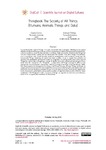Thingbook: The Society of All Things (Humans, Animals, Things and Data)
| dc.contributor.author | Corino, Gianni | |
| dc.contributor.author | Phillips, Mike | |
| dc.date.accessioned | 2017-02-01T16:13:28Z | |
| dc.date.accessioned | 2017-09-06T09:08:28Z | |
| dc.date.available | 2017-02-01T16:13:28Z | |
| dc.date.available | 2017-09-06T09:08:28Z | |
| dc.date.issued | 2016-05-24 | |
| dc.identifier.issn | 2531-5994 | |
| dc.identifier.uri | http://hdl.handle.net/10026.1/9897 | |
| dc.description.abstract |
In considering the origin of Things, it is quite conceivable that a designer, reflecting on the mutual affinities of organic and inorganic beings, on their morphological relations, their geographical distribution, cultural succession, social function and other such facts, might come to the conclusion that things had not been independently created, but had descended, like varieties, from other Things. Nevertheless, such a conclusion, even if well founded, would be unsatisfactory, until it could be shown how the innumerable Things, inhabiting this world have been modified, so as to acquire that perfection of structure and coadaptation which justly excites our imagination. In seeking out the future of the origin of Things the authors take a Beaglesque voyage to identify the social, cultural and technological forces which drive the emergence of a Thingbook - a place where all Things converge to define a new phylogenetic tree of networked relationships. With this homage to the Origin of Species (Darwin 1859), this paper explores the emergence of a society of all Things (Humans, Animals, Things and Data), by mapping the circumstances that have enabled this emergence and identifying the new relationships and behaviours that are developing between Things. It moves beyond morphic and linguistic relationships to the behavioural, performative and predictive qualities of algorithms that provide a DNA for future modification. The Thingbook is both a taxonomy of things, an algorithm for their form and behaviour, which in turn is a generative meshwork of relationships. | |
| dc.language.iso | en | |
| dc.relation.replaces | http://hdl.handle.net/10026.1/8343 | |
| dc.relation.replaces | 10026.1/8343 | |
| dc.title | Thingbook: The Society of All Things (Humans, Animals, Things and Data) | |
| dc.type | journal-article | |
| plymouth.journal | Digitcult. Scientific Journal on Digital Cultures | |
| dc.identifier.doi | 10.4399/97888548960245 | |
| plymouth.organisational-group | /Plymouth | |
| plymouth.organisational-group | /Plymouth/Faculty of Arts, Humanities and Business | |
| plymouth.organisational-group | /Plymouth/REF 2021 Researchers by UoA | |
| plymouth.organisational-group | /Plymouth/REF 2021 Researchers by UoA/UoA32 Art and Design: History, Practice and Theory | |
| plymouth.organisational-group | /Plymouth/Research Groups | |
| plymouth.organisational-group | /Plymouth/Research Groups/Institute of Health and Community | |
| plymouth.organisational-group | /Plymouth/Users by role | |
| plymouth.organisational-group | /Plymouth/Users by role/Academics | |
| dcterms.dateAccepted | 2016-04-01 | |
| dc.rights.embargoperiod | Not known | |
| rioxxterms.versionofrecord | 10.4399/97888548960245 | |
| rioxxterms.licenseref.uri | http://www.rioxx.net/licenses/all-rights-reserved | |
| rioxxterms.licenseref.startdate | 2016-05-24 | |
| rioxxterms.type | Journal Article/Review | |
| plymouth.oa-location | http://digitcult.lim.di.unimi.it/index.php/dc/article/view/38/28 |


